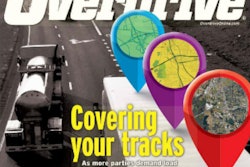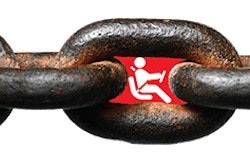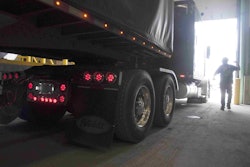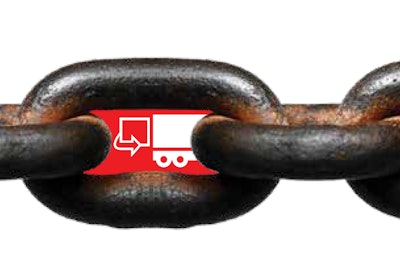

If there’s a hype machine in trucking that everybody seems to want in on but few know what it means, it’s the one around “blockchain.”
In its most basic form, it’s a way of distributing stored information in an online system to enhance visibility to parties contributing to the chain or using it. At the same time, it improves security of that information.
The concept emerged from the security infrastructure that Bitcoin, a decentralized digital currency, was built on. Those who understand it say its potential is great. It poses few downsides for freight and financial partners willing to operate with more transparency into their operations.
“I don’t think that small fleets will be the first adopters” of technologies associated with blockchain transactions, says Sandeep Kar, chief strategy officer of telematics provider Fleet Complete.
At the same time, he adds, “Larger fleets can benefit, but I believe blockchain will empower the small fleets most.” That includes one-truck independents, who will have opportunities to find new customers, break into new markets and speed up and/or automate their interactions with current partners.
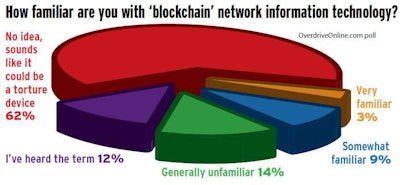
Blockchain in trucking is thought of most for its enabling greater automation in every phase of a freight move. For example, big grocery players Kroger and Walmart, among others working with IBM, last year tested a blockchain to track food-distribution moves down to the individual item, but its application could be much broader.

Owner-operators both independent and leased could be affected by new ways to establish a more comprehensive and accurate history of a truck’s ownership and maintenance. Company drivers and the fleets employing them also could see more thorough documentation of a driver’s employment history and new ways to broadcast it.
 DEFINING BLOCK AND CHAIN | Professional services firm Deloitte describes blockchain this way: A digital, distributed transaction ledger with identical copies maintained on each of the network’s members’ computers. All parties in the network can review previous entries and record new ones. The transactions are grouped in blocks, recorded one after the other in a chain of blocks (the “blockchain”). The links between blocks and their content are protected by cryptography, so previous transactions cannot be destroyed or forged. This means that the ledger and the transaction network are trusted without a central authority – a “middleman.”
DEFINING BLOCK AND CHAIN | Professional services firm Deloitte describes blockchain this way: A digital, distributed transaction ledger with identical copies maintained on each of the network’s members’ computers. All parties in the network can review previous entries and record new ones. The transactions are grouped in blocks, recorded one after the other in a chain of blocks (the “blockchain”). The links between blocks and their content are protected by cryptography, so previous transactions cannot be destroyed or forged. This means that the ledger and the transaction network are trusted without a central authority – a “middleman.”Blockchain’s emergence is a logical step in the evolution of trucking logistics, including the owner-operator business model. Its potential was foreshadowed in two trends that pointed to significant near-term change, cited in Overdrive’s “Tomorrow’s Trucker” series in 2016:
• An increasing reliance on digital communications platforms to automate parts of freight transactions.
• Growth in seamless digital connections between the financial side of independents’ businesses and those of their broker/shipper and carrier partners.
Both of those developments are under way to some extent with the rise of on-demand freight services from technology-enabled brokers. That includes major companies such as C.H. Robinson to startups like Convoy and Uber Freight.
What’s new is a coordinated effort around what’s often called “distributed ledger” database technology, which is at the heart of blockchain.
That effort coalesced in the Blockchain in Transport Alliance, a tech-standards-development organization. It’s an effort that former Truckload Carriers Association President and current BiTA President Chris Burruss describes as inverting the old “build it and they will come” adage. Once the idea took root, he says, “everybody showed up, and we had to build it.”
In late November, after being founded two months earlier by Craig Fuller (part of the Fuller family associated with U.S. Xpress), BiTA already had 530-plus member applications to sort through. Who’s part of the alliance? Transportation management software (TMS) system providers, shippers, carriers, rail intermodal service providers, factoring companies, brokers, telematics and mobile communications providers, electronic logging device makers – you name it.
Owner-operators might have minimal representation in BiTA, but many, especially independents, soon could feel – if they haven’t already – the integration of blockchain practices.
In this series, find some changes owner-operators, particularly independents, might notice and find benefit from:

